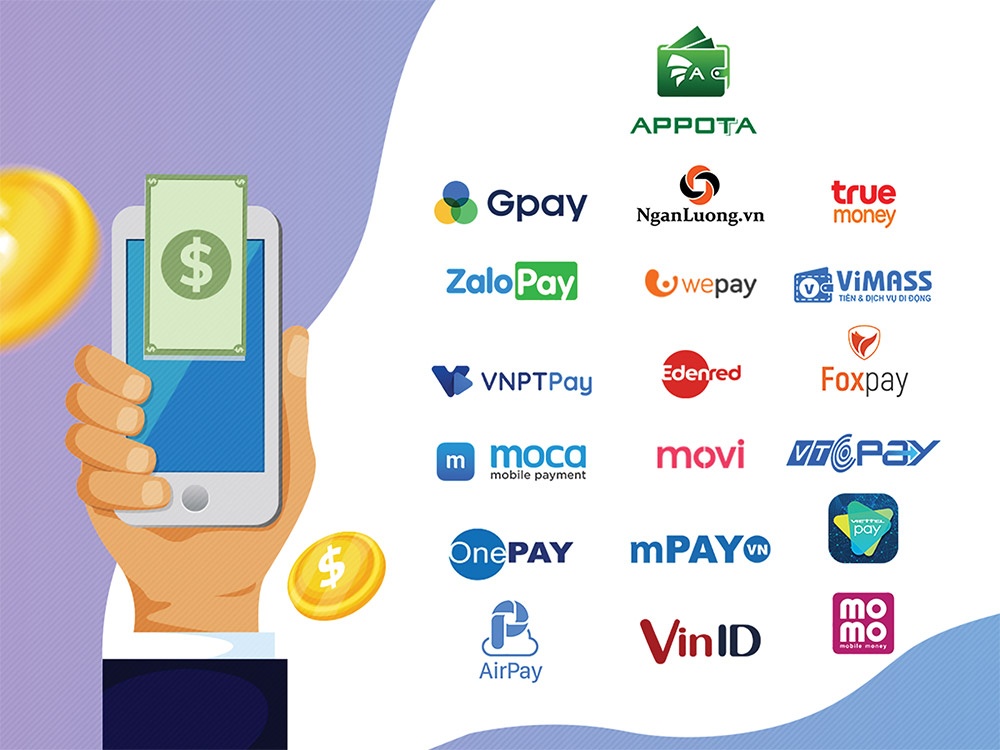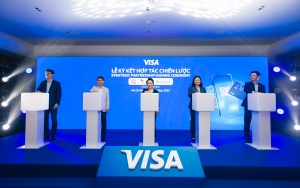E-wallet firms restructure for best interests of customers
 |
| There are plenty of payment service providers, but e-wallet user numbers are concentrated on only a few, Photo: Appota |
Starting from July 1, Moca will cease its e-wallet service on both the Moca and Grab applications. This move is part of the company’s strategy to restructure its service portfolio and enhance operational efficiency.
Moca director Nguyen Xuan Viet Binh explained, “By restructuring our service portfolio, we can focus on areas where we can deliver greater value to users while driving efficient and sustainable company growth.”
Alejandro Osorio, CEO of Grab Vietnam, added, “Since 2018, our strategic partnership with Moca has enabled us to provide a seamless and secure cashless payment experience for Grab users and small- and medium-sized enterprises in Vietnam. We will work closely with Moca to ensure that Grab users receive clear and specific guidance on this change and to facilitate a smooth refund process.”
According to FiinGroup, despite a crowded market with 50 intermediary payment service providers, e-wallet user numbers in Vietnam are concentrated on a few major providers like MoMo, Shopee Pay, and VNPay. The decision by Moca to exit the market has not disrupted other major players, but highlights the intense competition for market share.
A representative from Appota Group, the parent company of AppotaPay, stated, “At this moment, smaller e-wallets continue to operate within their licensed categories. The current period is very challenging as the market is dominated by a few big names.”
According to the State Bank of Vietnam, as of the end of 2023, there were 36.23 million active e-wallets, accounting for 63.23 per cent of the nearly 57.31 million e-wallets that had been activated. FiinGroup forecasts that by the end of 2024, there will be about 50 million active e-wallets in Vietnam, representing an increase of nearly 40 per cent compared to 2023.
According to a PwC report in late 2023, digital payments using e-wallets in Southeast Asia reached $22 billion in 2019 and are projected to grow more than five-fold, exceeding $114 billion by 2025. “Given the convenience it provides, digital wallets have proven to be a natural breeding ground for super apps in Southeast Asia,” PwC stated, highlighting the rise of Paytm in India and Alipay in China.
The digital wallet boom is partly driven by companies developing super apps that often include their own e-wallet offerings, such as WeChat and Alipay in China, Grab and GoTo in Southeast Asia, Careem in the Middle East, and Rappi and Mercado Libre in Latin America, noted an Oliver Wyman report.
In other countries, banks seldom build super apps, allowing e-wallets to thrive. However, in Vietnam, mobile banking is ubiquitous, according to one industry expert.
“Banks wait for e-wallets to create a market and achieve sufficient scale before entering the fray, leaving e-wallets with fewer opportunities. To turn a profit, e-wallets must transition into financial services, as exemplified by MoMo’s postpaid wallet service (similar to cash advances),” he said.
“Over the next three years, the use of e-wallets by the public will diminish,” the expert added. “Without promotions, users have no incentive to use them. For payments, people open their banking apps and scan QR codes, avoiding the hassle of topping up e-wallets. Banks do not need to acquire e-wallets, as they have already established customer bases. They only need to invest in smooth app development, whereas e-wallets lack substantial funds for technology investments.”
Most e-wallet payment services struggle to be profitable, leading each e-wallet to target different product niches, serving specific ecosystems or goals. Even in China, Alipay, WeChat Pay, and Meituan’s wallet only grew after gaining users, subsequently expanding into financial services for higher profits.
For existing e-wallets, services such as high-interest deposits, stock and bond purchases, investment, insurance, short-term loans, consumer loans, buy now pay later, and instalment plans are more flexible than banks, which face complex procedural constraints. In contrast, e-wallets only need to partner with third parties to offer these services, suggesting growth in this area.
However, using e-wallets for payments will decline in use, as bank apps can scan QR codes instantly. FiinGroup forecasts that by the end of this year, there will be around 50 million active e-wallets in Vietnam, a nearly 40 per cent increase from 2023. Most leading e-wallets are still without profits. In contrast, intermediary payment companies are profitable due to the large transaction volumes covering operational costs.
Many believe that intense competition will soon lead to mergers among e-wallet providers, forming a few top super apps dominating regional and local markets. Furthermore, super apps and service providers from other economic sectors (such as e-commerce, retail, and financial services) will also collaborate.
The representative from AppotaPay said, “To sustain its growth trajectory, we will focus on enabling customers to access quick and cost-effective payment solutions tailored to its existing user base through diverse and customer-specific policies.”
 | Fintech enterprises deploying innovative e-wallet initiatives to capture fair share A wide variety of innovative payment systems are expected to assist Vietnam in moving closer to its objective of achieving financial inclusion and a cashless society in the not-too-distant future. However, there will be fierce competition. |
 | MoMo dominates Vietnam's e-wallet market with 68 per cent share The cashless payment landscape in Vietnam is experiencing a surge of activity, with MoMo emerging as the dominant player in the e-wallet sector. Positioned at the forefront of this dynamic market, MoMo has solidified its position as the go-to choice for Vietnamese consumers seeking convenient and secure digital transactions. |
 | Thai, Chinese firms tie up in cross-border payment TrueMoney, a leading fintech company in Thailand, has partnered with Ant Group of China to launch cross-border mobile payments between Thailand and China, allowing Thai tourists to use TrueMoney e-wallet to make payments to tens of millions of merchants in China. |
 | Visa partners with Vietnamese e-wallet apps Visa has announced a new partnership with three of the most popular e-wallets in Vietnam – MoMo, VNPAY and ZaloPay – to provide a more convenient payment experience for cardholders at participating small- and medium-sized enterprises (SMEs). |
What the stars mean:
★ Poor ★ ★ Promising ★★★ Good ★★★★ Very good ★★★★★ Exceptional
Related Contents
Latest News
More News
- Private capital funds as cornerstone of IFC plans (February 20, 2026 | 14:38)
- Priorities for building credibility and momentum within Vietnamese IFCs (February 20, 2026 | 14:29)
- How Hong Kong can bridge critical financial centre gaps (February 20, 2026 | 14:22)
- All global experiences useful for Vietnam’s international financial hub (February 20, 2026 | 14:16)
- Raised ties reaffirm strategic trust (February 20, 2026 | 14:06)
- Sustained growth can translate into income gains (February 19, 2026 | 18:55)
- The vision to maintain a stable monetary policy (February 19, 2026 | 08:50)
- Banking sector faces data governance hurdles in AI transition (February 19, 2026 | 08:00)
- AI leading to shift in banking roles (February 18, 2026 | 19:54)
- Digital banking enters season of transformation (February 16, 2026 | 09:00)

 Tag:
Tag:



















 Mobile Version
Mobile Version